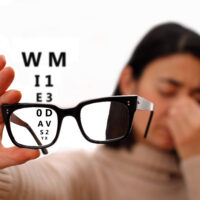Vision Loss and GLP-1 Drugs: Can You Sue the Makers of Ozempic and Wegovy for NAION?

Medications like Ozempic and Wegovy have gained enormous popularity in recent years for managing type 2 diabetes and, increasingly, for weight loss. Both drugs belong to a class of medications called GLP-1 receptor agonists, which help regulate blood sugar and suppress appetite. But while these medications have helped many people manage chronic health conditions, troubling reports have emerged about serious, sometimes permanent side effects, including a rare but devastating eye condition known as Non-Arteritic Anterior Ischemic Optic Neuropathy (NAION).
If you or a loved one developed sudden vision loss while taking Ozempic, Wegovy, or other GLP-1 medications, it is natural to wonder whether the drug manufacturer could be held liable for the harm you’ve suffered. At Leandros A. Vrionedes, P.C., we help New Yorkers harmed by dangerous or defective medications understand their rights and pursue compensation for life-altering injuries.
Here’s what you should know about NAION, its possible link to GLP-1 receptor agonists, and your legal options if you’ve been affected.
What Is NAION?
Non-Arteritic Anterior Ischemic Optic Neuropathy (NAION) is a condition in which blood flow to the optic nerve is suddenly reduced or blocked, causing damage that can lead to permanent vision loss. Unlike other optic nerve disorders, NAION is not caused by inflammation but rather by insufficient blood supply.
NAION is one of the most common causes of sudden optic nerve-related vision loss in people over 50. It often strikes without warning and usually affects just one eye at first. Common symptoms of NAION include:
- Sudden vision loss in one eye, typically painless
- Blurred or dim vision
- Loss of peripheral (side) vision or central vision
- Visual field defects, such as dark spots or shadows
In some cases, the condition may worsen over days or weeks, but once vision is lost, it often cannot be restored.
Reports Linking Ozempic and Wegovy to Vision Loss
While the risk of NAION has long been linked to certain underlying health conditions like diabetes, high blood pressure, and sleep apnea, recent reports suggest that GLP-1 receptor agonists like Ozempic and Wegovy may also increase the risk of developing this serious condition.
Some patients using these drugs have reported sudden vision changes consistent with NAION shortly after starting treatment. The suspected link is not yet fully understood, but it may be related to the drugs’ impact on blood circulation and vascular health.
If these medications increase the risk of NAION, drug manufacturers could potentially face liability for failing to adequately warn patients and doctors about this risk or for designing a medication that poses unreasonable dangers to users.
Can You Sue the Drug Manufacturer?
If you develop NAION after taking Ozempic, Wegovy, or a similar GLP-1 medication, you may have grounds for a product liability claim against the drug’s manufacturer under New York law. Dangerous drug lawsuits generally fall under two main legal theories:
-
Failure to Warn: Drug makers must provide clear warnings about known risks. If the manufacturer knew or should have known about the risk of NAION but failed to include appropriate warnings, they could be held liable for harm caused by that lack of information.
-
Defective Design: If the medication’s design makes it unreasonably dangerous when used as intended, the manufacturer can be held accountable. This can include situations where safer alternative designs or formulations were available.
If evidence shows a link between GLP-1 receptor agonists and NAION and that the manufacturer failed to warn patients or healthcare providers about this risk, you may be able to recover compensation for your injuries.
What to Do If You Develop Vision Loss
If you’re taking Ozempic or Wegovy and experience sudden changes in your vision, seek emergency medical attention right away. Early diagnosis is critical, although unfortunately, there is no proven treatment that can reverse NAION once damage has occurred. Next, talk to your doctor about whether your medication could have contributed to your vision loss. Keep detailed records of when you started taking the drug, any warnings or information you were given, when your vision symptoms began, and your medical evaluations and diagnoses.
If your vision loss is diagnosed as NAION, speak with an experienced dangerous drug attorney as soon as possible. Your lawyer can help gather medical evidence, consult with experts, and determine whether you have a viable claim against the manufacturer.
Damages You May Be Entitled To
If your lawsuit is successful, you could recover compensation for damages such as:
- Medical expenses (diagnosis, treatments, and future vision care)
- Loss of wages and future earning capacity if vision loss affects your ability to work
- Pain and suffering from the physical and emotional toll of losing your sight
- Loss of enjoyment of life if permanent vision damage affects your independence and daily activities
Vision loss can drastically change your quality of life. Holding the drug manufacturer accountable may help you secure the resources you need to adapt and move forward.
Talk to an Ozempic Lawyer Today
At Leandros A. Vrionedes, P.C., we have decades of experience standing up for New Yorkers harmed by dangerous products and defective drugs. If you or a loved one developed NAION or sudden vision loss after taking Ozempic or Wegovy, don’t wait—contact us today for a free consultation. We’ll listen to your story, explain your rights, and fight for the compensation you deserve.
